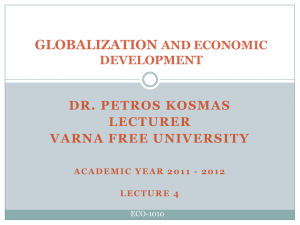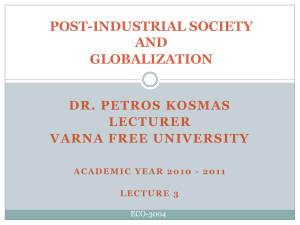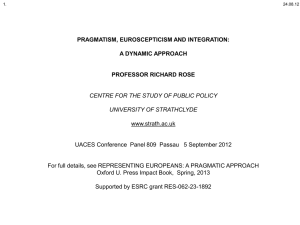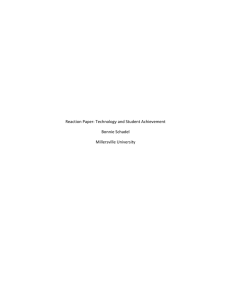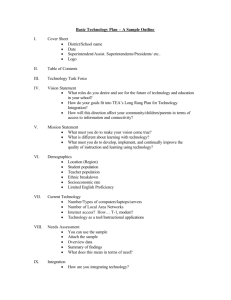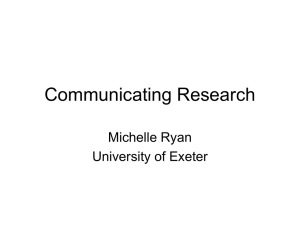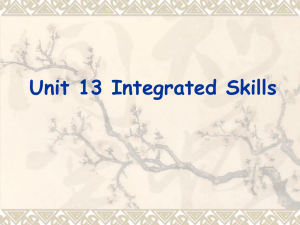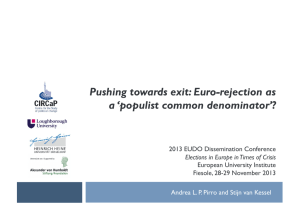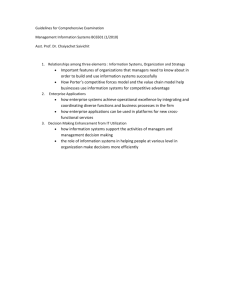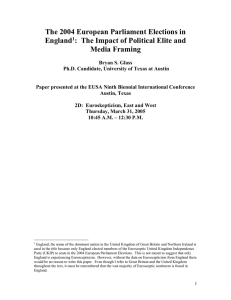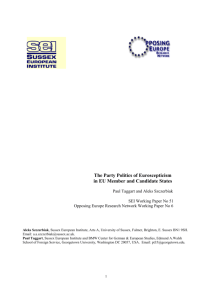Metapsychology of Euroscepticism
advertisement
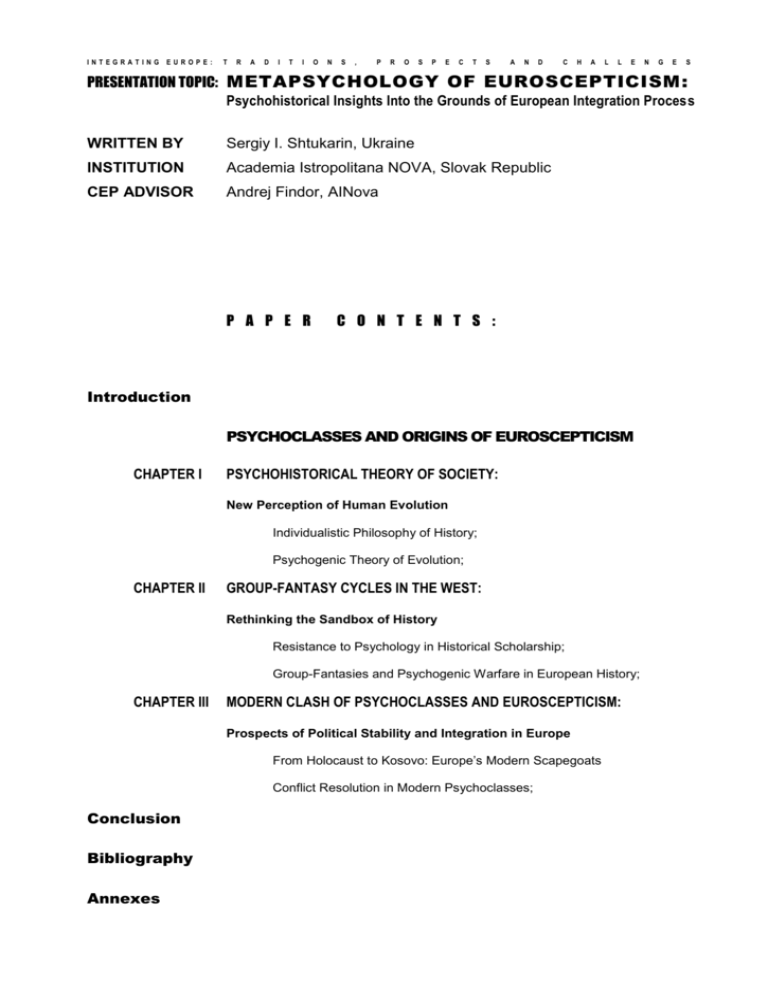
INTEGRATING EUROPE: T R A D I T I O N S , P R O S P E C T S A N D C H A L L E N G E S PRESENTATION TOPIC: METAPSYCHOLOGY OF EUROSCEPTICISM: Psychohistorical Insights Into the Grounds of European Integration Process WRITTEN BY Sergiy I. Shtukarin, Ukraine INSTITUTION Academia Istropolitana NOVA, Slovak Republic CEP ADVISOR Andrej Findor, AINova P A P E R C O N T E N T S : Introduction PSYCHOCLASSES AND ORIGINS OF EUROSCEPTICISM CHAPTER I PSYCHOHISTORICAL THEORY OF SOCIETY: New Perception of Human Evolution Individualistic Philosophy of History; Psychogenic Theory of Evolution; CHAPTER II GROUP-FANTASY CYCLES IN THE WEST: Rethinking the Sandbox of History Resistance to Psychology in Historical Scholarship; Group-Fantasies and Psychogenic Warfare in European History; CHAPTER III MODERN CLASH OF PSYCHOCLASSES AND EUROSCEPTICISM: Prospects of Political Stability and Integration in Europe From Holocaust to Kosovo: Europe’s Modern Scapegoats Conflict Resolution in Modern Psychoclasses; Conclusion Bibliography Annexes INTEGRATING EUROPE: T R A D I T I O N S , P R O S P E C T S A N D C H A L L E N G E S ANNEX 1: RESEARCH METHOD: THE BASIC METHOD OF A SOCIAL SCIENTIST OR CAN ONE DO ANY SOCIAL RESEARCH WITHOUT INTROSPECTION? “A psyche can only explore itself to discover the motives of another. Unknowable are the motives of another species, yet it is only by discovering the “Hitler in ourselves” that we can understand a Hitler” -- Lloyd deMause S C H E M A O F S O C I A L M E T H O D : FIRST LEVEL OF ANALYSIS ASSUMPTION > ! < EVERYBODY GOES TO WAR SOMETIME CONCLUSION >>> IN A GIVEN TIME EVERYONE GOES TO WAR BECAUSE OF AN AGGRESSIVE HUMAN NATURE, INHERITED BY ALL HUMANS RESULT <<< METHOD PROVES NOTHING, BECAUSE HUMAN NATURE IS NOT SPECIFIED SECOND LEVEL OF ANALYSIS ASSUMPTION > ! < EVERYBODY GOES TO WAR SOMETIME BECAUSE HUMAN NATURE SOMETIMES MOTIVATES ONE TO CONCLUSION >>> MY NATURE IS THE SAME, THUS I SHOULD AVOID IT TO SEE AS OBJECTIVELY AS POSSIBLE WHY PEOPLE GO TO WAR RESULT <<< AGAIN PROVES NOTHING, BECAUSE HOLISTIC ENTITIES, TAUTOLOGICAL DEFINITIONS AND RELATIVIST CONCEPTIONS OF HUMAN NATURE APPEAR THIRD LEVEL OF ANALYSIS ASSUMPTION > ! < EVERYBODY GOES TO WAR SOMETIME BECAUSE ONE’S INDIVIDUAL DEVELOPMENT STIPULATED THE MOTIVATION TO GO TO WAR IN THE SPAN OF TIME CONCLUSION >>> MY INDIVIDUAL DEVELOPMENT CONTAINS THE SAME ELEMENTS AS OTHERS POSSESS, AND ONLY WHEN I IDENTIFY THEM IN MYSELF, I WOULD BE ABLE TO RECOGNIZE THEM IN OTHERS TO EXPLAIN WHY THEY (AS WELL AS I MYSELF USED TO) SOMETIMES GO TO WAR RESULT <<< METHOD GIVES THE ULTIMATE INSIGHT INTO HUMAN NATURE, THUS VALID FOR EXPLAINING EVERY ASPECT OF SOCIAL REALITY IN ITS HISTORICAL DEVELOPMENT, YET CAN BE APPLIED AFTER TRAINING OF A SPECIAL KIND INTEGRATING EUROPE: T R A D I T I O N S , P R O S P E C T S A N D C H A L L E N G E S INTRODUCTION: European Integration process has undergone already a considerable path during the span of the living generation alone. The Second 30-year War (1914-1945) – the most disastrous war in history, waged mainly by neighboring European nations – just in few years was replaced by a peaceful initiative of the scale that was again unprecedented in the history of humanity. Supra-national institutions that are taking shape in European Union nowadays are likely to alter the monopolist position of national governments over their peoples soon, a trend that is already facing opposition both from the governments and from the peoples of Europe. The cancer of this euroscepticism not only challenges the rhetoric of proponents of wide-scale integration, but also undermines the very basis of this process, infecting the newly-born single currency unit-Euro and weakening its financial positions, thus giving ground for further pessimistic speculations. Too many explanations reasonable enough were given so far to this state of things, that for one with little practical background in the core of European Institutions it might seem difficult, if not impossible to contribute to the understanding of the complex processes that are reflected in European politics and top decision-making surrounding the issue of integration. Yet it appears to be an illusion, as illusionary is the hope for easy overcoming of euroscepticism as long as no trustworthy insights into the very origins of peoples’ frustration over their common future are presented – from groups other than elected politicians, interest groups or political scientists, backing them up. If not performing this promising attempt, the author aspires to contribute to such shift of analysis (from the consequences – to the roots) by offering a draft application of revolutionary-new social theory to the case of integrating Europe and proposing the areas for future close investigation. INTEGRATING EUROPE: T R A D I T I O N S , P R O S P E C T S A N D C H A L L E N G E S PSYCHOCLASSES AND ORIGINS OF EUROSCEPTICISM CHAPTER I: PSYCHOHISTORICAL THEORY OF SOCIETY “The ultimate source of all historical change is psychogenesis, the lawful change in the childrearing modes occurring through generational pressure and psychospeciation” – Lloyd deMause In order to allow for further consideration of the recent insights into human psyche’s acting on the stage of history, we should consider first the method that enabled some radical social scientists to introduce the very new philosophy of history. This method can be characterized as (1) introspection combined with (2) interdisciplinary approach. (1) The Renaissance of scientific introspection – which was once at the corner of psychological science but was neglected and forgotten despite it had never been proved to be a-scientific as some opponents claimed – can be traced since the mid-20th century. Today’s state of this method is determined by the principle – “A psyche can only explore itself to discover the motives of another. Unknowable are the motives of another species, yet it is only by discovering the ‘Hitler in ourselves’ that we can understand a Hitler”. According to author’s classification device (see Annex 1), this can be labeled as the third level of social analysis, which is the only one capable of producing insights into social reality, assuming that there is no entity beyond individual as society, as claimed by lower methodological dogmas. (2) The application of the interdisciplinary approach as well proved to be fruitful. After the fall of sociobiology that borrowed the common notions from Darwinian evolutionary biology and was incapable to produce real theories of cultural evolution in human populations, a drastically new concept of interdisciplinary approach was implemented to produce a new social theory. The Dilemma of many sciences seems to be solved by a bold INTEGRATING EUROPE: T R A D I T I O N S , P R O S P E C T S A N D C H A L L E N G E S attempt to create of theory not on the ground of the hard facts from various fields, but namely the opposite – to deal with the blind spots of the maintrend theories of the dealt sciences. Despite the questionable scientific validity of the said method, it gave the insights into fields, mostly ignored or mistreated by “serious” science. From the genetic biology and neurobiology it was taken the concept of epigenesis, still disputed in scientific community, applied to the development of psyche of the fetus in the womb, disregarded by orthodox psychologists. And on the basis of the evidence from the clinical psychiatry data on the adult memories of the fetal drama – produced the concept of human history as restaging of early traumas, with better childrearing modes as the main engine of psychogenic evolution of human populations and consequent cultural change in various groups. Thus, for many reasons, the approach described above is dubious with a bulk of old-minded scientific community, which nevertheless makes it even more attractive for us to attempt its application to the subject of European integration after such a brief overview and giving some closer view of the foundations of the psychogenic theory as story goes (See Annex 2). Yet the seeming simplicity of the main idea it should already be noticed that the scope of the theory goes far beyond the areas of investigation that all other social sciences assumed so far (even if not taking into account their general refusal to build universal theories within their respective fields). The emerging science of Psychohistory would soon swallow all other social sciences, for it possesses the predictive powers, so desired from social science, which the current methods can not provide us with. And this is going to be our secondary target – to attempt presenting the futuristic view of European integration on the basis of psychohistorical analysis of the primary subject of this research, i.e. euroscepticism. INTEGRATING EUROPE: CHAPTER II: T R A D I T I O N S , P R O S P E C T S A N D C H A L L E N G E S GROUP-FANTASY CYCLES IN THE WEST: …“Serious” history has long been considered a record of public not private events. We instead should ask how each generation of parents and children creates those issues which are acted out in arena of public life.” – Lloyd deMause Euroscepticism, as any other political attitude according to the present dogma of political science should be considered following the next assumption: "Political attitudes are generally assumed to be the result of a rational, reflective process." That this is not really so we can see from the course of events in human history, where completely irrational events compose most of the Sandbox of History, with only historians trying to find rationalizations to the turmoil in the world decades after the real events, misinterpreting them replacing historical motivations with their substitute historical logic. This trying to explain history by “impersonal structural forces” is a simple following by historians the disproved Standard Social Science Model of cultural determinism, which says "culture determines social behavior" a statement that is simply a tautology. “Since ‘culture’ only means ‘the total pattern of human behavior’ (Webster), to say ‘culture is what makes a group do such and such’ is merely stating that a group's behavior causes its behavior.” If we attempt to avoid this mistaken perception of human history, and try to see the psychological motivations beyond any historical activity of individuals, we will approach to the understanding (1) of history as acting out of individuals’ psychic motivations deprived of the intra-psychic defense mechanisms, that are switched off when individual joins the group, and (2) that individuals use or even form groups them namely to restage their early personal events through group-fantasies, by entering into social alters. “Even though no group is too small to synchronize and act out the group-fantasies of its members, the larger the group the more deeply it can INTEGRATING EUROPE: T R A D I T I O N S , P R O S P E C T S A N D C H A L L E N G E S enter into the social trance and the more irrational the group-fantasies it can circulate and act out. The dissociated shame that is operative in small groups is equally there in nations. <…> That nations have a central persecutory task is a widely-denied truth. That nations are necessary for more rational enterprises than war and brutal domination of others is a wholly unproven assumption. In truth, most members of most nations participate in one way or another in the torture and killing of others and in economic and political domination. We only deny it by colluding in such delusions as that leaders are to blame, that suffering is deserved, that punishment reforms, that killing is moral, that some people are not human, that sacrifice brings renewal and that violence is liberating. Indeed, most of what is in history books is stark, raving mad-the maddest of all being the historian's belief that it is sane.” Lloyd deMause distinguished such group-fantasies as: - PROSPERITY PANICS AND INTERNAL SACRIFICES; - WAR AS A SACRIFICIAL RITUAL; - THE LEADER AS POISON CONTAINER. Where nations are about producing social violence to relieve the anxieties produced by their getting richer which revives common memories of neglectful or over-protective childrearing. DeMause also elaborated 4 consequent phases of acting out these fantasies that in modern societies are mostly connected with elected leaders, who need to be sacrificed for the sins of the group (Christianity is a perfect example how this fantasies emerged and fixed in European peoples’ unconscious). These phases of group-fantasy parallel the four phases of birth. The four leadership phases are: (1) strong, (2) cracking, (3) collapse and (4) upheaval – they develop as leaders become less and less able to provide grandiose manic solutions to the nation's growing growth panic, and result in either a sacrificing of the leader or in sacrificial wars against home and INTEGRATING EUROPE: T R A D I T I O N S , P R O S P E C T S A N D C H A L L E N G E S abroad poison containers if the leader appears to be potent enough to produce ones. “Wars are sacrificial defenses that have proven to be effective in reducing fears of ego disintegration due to prosperity panic. But even more effective than sacrificing mothers and children in external wars is the internal, institutionalized wars against mothers and children that nations conduct periodically as social policy. Structural violence (excess deaths because of poverty alone) amount to 15 million persons a year world wide, compared to an average 100,000 deaths per year from wars. Economic recessions hurt and kill more mothers and children as sacrificial victims than most wars. As in foreign wars (external sacrifices), political and economic wars against mothers and children (internal sacrifices) are regularly conducted during periods of peace and prosperity.” Since it is prosperity and the fear of intolerable growth that triggers the restaging of trauma, it makes psychohistorical sense that European Union now experiences a revival of euroscepticism that is as we will later learn in detail, connected directly with the group-panic over the economic growth in integrating Europe. This is closely connected also with the complicated evolutionary processes in the European nations themselves, the eternal conflict of older psychoclasses that dominate in the group-fantasy-making of the nation – and newer ones that restage their traumas differently and thus aspire to produce new group-fantasies of the mechanism corresponding to their own social alters. Thus after reviewing briefly the theoretical background of group-fantasies, we can arrive to the hypothesis that was stated in the introduction and which is going to be tested and verified in the last chapter, that whatever the seemingly “objective” economic reasons that give ground for euroscepticism, it is about the people’s feelings of shame produced by the economic success of early stages of integration rather than the failure, and that the present not-so-promising position of the current common INTEGRATING EUROPE: T R A D I T I O N S , P R O S P E C T S A N D C H A L L E N G E S initiatives (as EMU and its Euro) is ones again the example how economic factors are vulnerable to merely psychological moods of the nations. CHAPTER III: MODERN CLASH OF PSYCHOCLASSES AND EUROSCEPTICISM “…Today’s euro-sceptics have an embarrassment of riches. Many refuse to accept just how far we have come and what we have achieved” – Jonathan Collett, “Eurocritic” Campaing Director, The Bruges Group According to the psychogenic theory of history, each society comprises of individuals belonging to different psychoclasses and that they form groups with those sharing their restaging mechanisms to produce group-fantasies to relieve common anxieties. Most of the European countries have all 6 psychoclasses within their populations, with socializing mode as the dominant one. The processes of integration created the circumstances where the conflicts surrounding the birth of the new psychoclass are getting into interference with the processes of psychospeciation and psychogenesis in European populations that are now influenced by their merging. The conflict of psychoclasses follows the same 4-phase pattern that now takes form of (1) innovative, (2) depressed, (3) manic and (4) war phases cycle. This assumption can suggest that the intra-psychic conflict resolution should be getting considerably severe form over time, and this seems to be true, if we consider the fact that in 1999 for the first time in 50 years after 1945 European nations got fully involved into armed conflict in European soil as the NATO operation in Kosovo had been, with Allied forces severe bombings of the cities of “aggressor” and German tanks entering civil settlements just as it occurred half a century ago (now on the “right side” as Joshka Fisher said). We can see how the European scapegoats of the past (Jews, communists, etc.) were replaced over time with modern scapegoats – underdeveloped nations and poor people, who INTEGRATING EUROPE: T R A D I T I O N S , P R O S P E C T S A N D C H A L L E N G E S poison the growth of rich European nations and need to be cleansed to relieve the shame of prosperity. Yet there should be noticed the other side of this process, that the rule of higher psychoclasses (the higher the psychogenic mode of psychoclass, the less it is necessary for it to act out its conflicts) can be applied to Europe here too, to see the origins of euroscepticism and gain the possibility to predict its influence in different European nations and spread to other (lower) psychoclasses through imposing on them the defensive mechanisms of the dominant ones. Thus the true stability and prosperity in Europe can be achieved only if the next generation of policy-makers will create the conditions for the improvement of the balance of psychoclasses in European societies, strengthening the positions of the higher ones by spreading the values of higher psychogenic modes and manipulating the group-fantasies to avoid the falling into new scapegoat-searching and purification wars of all kinds. CONCLUSION: In the paper, the application of the Psychogenic theory of History was proposed to the case of euroscepticism as group-fantasy, connected with drastic transformations that European societies are currently undergoing. The aim of the paper was not in investigation of the political, economic and cultural processes that are usually considered as the main INTEGRATING EUROPE: T R A D I T I O N S , P R O S P E C T S A N D C H A L L E N G E S roots of euroscepticism, but rather a proposing of the revolutionary new vision on the problem, that appears to be influential in European politics and urgent for the future development of European integration process. Thus new areas of social research were proposed and new practices of decisionmaking were pointed out. BIBLIOGRAPHY:
